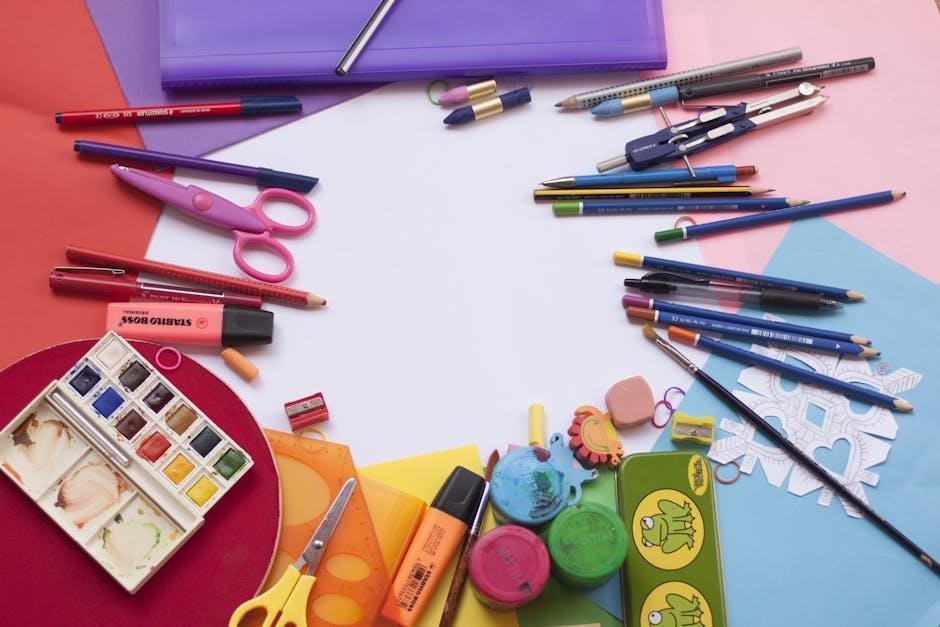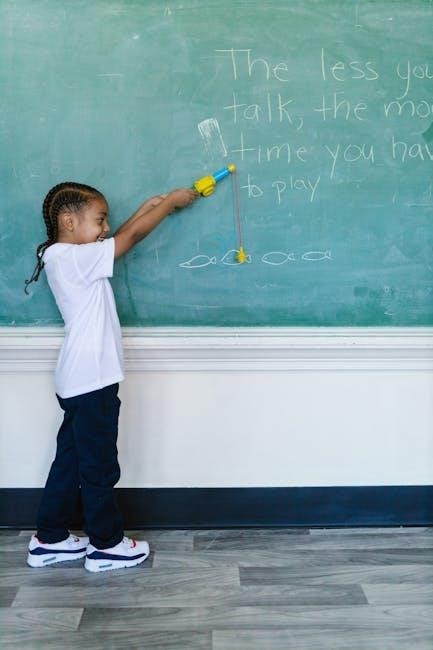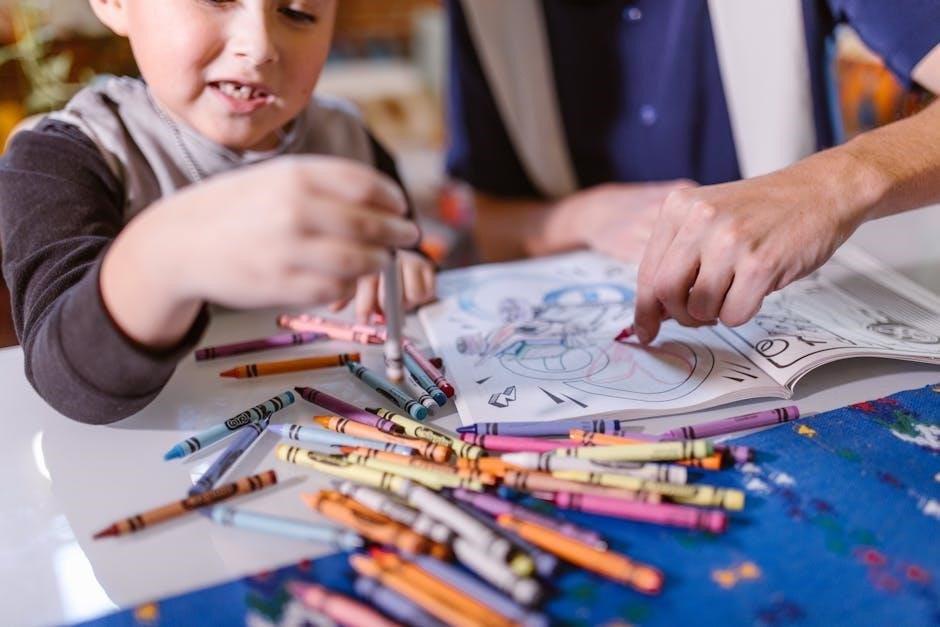writing worksheets for kindergarten pdf
Writing worksheets for kindergarten are essential tools that help young learners develop foundational skills in writing and creativity․ They introduce basic letter tracing‚ simple words‚ and shapes‚ fostering motor skills and cognitive development․ These resources are designed to be engaging and educational‚ preparing children for reading and writing proficiency․ Parents and teachers can use these worksheets to create a fun and structured learning environment‚ encouraging creativity and academic growth from an early age․
Importance of Writing Worksheets in Early Childhood Education
Writing worksheets play a crucial role in early childhood education by fostering essential skills like fine motor control‚ hand-eye coordination‚ and creativity․ They introduce young learners to the basics of writing‚ such as letter formation and number recognition‚ in a structured yet engaging manner․ These resources help children develop problem-solving abilities and build confidence in their academic journey․ Worksheets also encourage independence‚ allowing kids to practice at their own pace․ By incorporating fun and interactive activities‚ they make learning enjoyable and prepare children for more complex tasks in later grades․ Regular use of writing worksheets can significantly enhance a child’s readiness for reading and writing proficiency․
Alphabet Tracing Worksheets
Alphabet tracing worksheets are foundational tools for teaching young children letter recognition and writing skills․ They provide structured practice for mastering uppercase and lowercase letters‚ enhancing fine motor abilities and early literacy development․
Uppercase Letters Tracing
Uppercase letter tracing is a fundamental skill for kindergartners‚ helping them recognize and write capital letters accurately․ Worksheets often feature large‚ clear letters with guiding arrows or dots to direct proper stroke order․ These tools enhance fine motor skills and hand-eye coordination while introducing children to the alphabet’s structure․ Tracing uppercase letters builds confidence and lays the groundwork for reading and writing proficiency․ Many worksheets incorporate engaging visuals and themes to keep young learners motivated․ Parents and educators can use these resources to create structured yet fun practice sessions‚ ensuring a strong foundation in early literacy skills․ Regular practice with uppercase letters tracing fosters consistency and improves letter formation abilities in young children․

Lowercase Letters Tracing
Lowercase letter tracing is a crucial step in teaching kindergartners to write‚ as most texts use lowercase letters․ Worksheets typically feature letters with starting dots or arrows to guide proper formation․ These exercises help children develop fine motor skills and understand letter shapes․ Lowercase letters often have unique curves and lines‚ which can be challenging for young learners․ Tracing these letters repeatedly improves accuracy and muscle memory․ Many worksheets include visual aids or themes to make practice enjoyable․ Regular tracing helps children transition smoothly to writing sentences․ Parents and educators can reinforce these skills by encouraging daily practice and providing feedback․ Mastering lowercase letters is essential for building a strong foundation in writing and reading abilities․

Number Tracing Worksheets
Number tracing worksheets help kindergartners recognize and write numerals‚ enhancing fine motor skills and number formation․ They often include sequences or patterns‚ making learning engaging and fun for young children․
Tracing Numbers 1-10
Tracing numbers 1-10 is a fundamental step in early childhood education‚ helping children develop number recognition and writing skills․ These worksheets typically feature large‚ clear numerals with arrows indicating the correct tracing direction․ They are designed to improve fine motor control and hand-eye coordination‚ essential for writing proficiency․ By practicing these basic numbers‚ children build a strong foundation for math and literacy; Many worksheets incorporate fun visuals or themes to keep young learners engaged․ Regular practice with tracing numbers 1-10 ensures mastery of numeral formation‚ preparing children for more complex number tracing and math concepts in the future․ Consistency and positive reinforcement are key to their success․
Tracing Numbers 11-20
Tracing numbers 11-20 builds on the foundational skills developed with numbers 1-10‚ introducing children to two-digit numerals․ These worksheets typically feature clear‚ large numbers with arrows guiding the tracing direction‚ helping children understand the correct formation of each digit․ They are designed to enhance fine motor skills and number recognition‚ preparing children for basic arithmetic operations․ Many worksheets include fun visuals or themes to maintain engagement․ Regular practice with tracing numbers 11-20 reinforces numeral formation and sequencing‚ laying the groundwork for math proficiency․ Teachers and parents can use these resources to create interactive learning sessions‚ ensuring children master two-digit numbers in a structured and enjoyable manner․ Consistency and positive reinforcement are key to their progress․
Shape Tracing Worksheets
Shape tracing worksheets help children recognize and replicate basic forms‚ enhancing fine motor skills and hand-eye coordination․ They introduce foundational geometry concepts through engaging‚ repetitive exercises․
Basic Shapes (Circle‚ Square‚ Triangle)
Basic shape tracing worksheets introduce kindergarten students to fundamental geometric forms like circles‚ squares‚ and triangles․ These exercises help children develop recognition and replication skills‚ laying the groundwork for understanding more complex shapes later․ Tracing activities improve fine motor control and hand-eye coordination‚ essential for writing and drawing․ By practicing these shapes‚ children also begin to connect them to real-world objects‚ enhancing their cognitive development; Worksheets often feature large‚ clear outlines‚ making it easy for young learners to follow and repeat․ This foundational skills-building prepares students for advanced shape recognition and creative applications in art and math․ These activities are both educational and engaging‚ fostering a strong foundation in early childhood education․
Advanced Shapes (Rectangle‚ Oval‚ Heart)
Advanced shape tracing worksheets for kindergarten introduce children to more complex forms like rectangles‚ ovals‚ and hearts․ These exercises build on basic shape recognition‚ enhancing fine motor skills and hand-eye coordination․ Tracing rectangles helps students understand right angles‚ while ovals and hearts refine curve-drawing abilities․ These shapes often appear in real-world objects‚ aiding cognitive development․ Worksheets may include colorful designs or patterns to make learning engaging․ Mastering advanced shapes prepares children for more intricate drawing and writing tasks․ These activities also foster creativity and problem-solving skills‚ laying a strong foundation for future academic success in math‚ art‚ and beyond․ They are both fun and educational‚ making learning enjoyable for young students․

Word Formation Worksheets
Word formation worksheets help kindergarten students build vocabulary and spelling skills through tracing and arranging letters․ These activities foster creativity and provide a foundation for early literacy․
Simple CVC Words Tracing
Simple CVC (Consonant-Vowel-Consonant) words tracing worksheets introduce kindergarten students to basic word structures․ These exercises help children practice tracing letters to form short‚ familiar words like “cat‚” “dog‚” and “sun․” By repeating the motion of tracing‚ students develop fine motor skills and letter recognition‚ laying the groundwork for reading and spelling․ CVC words are foundational for early literacy‚ as they often represent common‚ relatable objects․ Tracing these words reinforces phonics skills‚ helping children connect sounds to letters and understand word families․ Engaging and repetitive‚ these worksheets make learning fun and build confidence in young writers․ They also serve as a stepping stone for more complex word formation activities․
Sight Words Practice

Sight words practice is a crucial component of early literacy development․ These worksheets help kindergarten students recognize and memorize high-frequency words that are not always phonetically regular․ By tracing and writing sight words‚ children improve their spelling and reading fluency․ Interactive exercises‚ such as matching games and word searches‚ make learning engaging․ Sight words are foundational for building confidence in reading and writing․ Worksheets often include common words like “the‚” “and‚” and “is‚” which are essential for early readers․ Regular practice with these words helps students transition from emergent to fluent reading‚ creating a strong foundation for future academic success․ These activities are designed to be fun and repetitive‚ reinforcing memory and recognition of sight words․

Free Resources for Kindergarten Writing Worksheets
Discover a variety of free kindergarten writing worksheets online‚ offering alphabet tracing‚ number practice‚ and word formation activities․ Educational websites provide PDF downloads for easy access‚ ensuring engaging and structured learning experiences for young children․
Popular Websites for Downloading PDF Worksheets
Several reputable websites offer free PDF worksheets tailored for kindergarten writing practice․ PBS LearningMedia provides engaging activities aligned with educational shows․ Education․com features customizable worksheets focusing on alphabet tracing‚ numbers‚ and basic shapes․ Teachers Pay Teachers is a popular platform with a wide range of teacher-created resources․ Worksheetfun offers printable PDFs covering word formation‚ sight words‚ and tracing exercises․ These websites are user-friendly‚ with easy-to-download formats that cater to both parents and educators․ They provide high-quality materials that support early childhood development‚ ensuring children build strong foundational writing skills․ Exploring these resources can enhance learning experiences and make teaching more effective for young students․

Tips for Parents and Teachers
Encourage daily practice with engaging worksheets‚ provide guidance‚ and celebrate progress․ Make writing fun by incorporating games and visual aids‚ fostering a love for learning in young children․
How to Use Worksheets Effectively in Teaching
Using worksheets effectively involves creating a structured yet engaging environment․ Start with short sessions to maintain young children’s attention spans․ Provide clear instructions and demonstrate tasks to ensure understanding․ Encourage guided practice‚ allowing children to work independently afterward․ Offer positive reinforcement and constructive feedback to build confidence․ Differentiate instruction by adapting worksheets to meet individual skill levels․ Incorporate hands-on activities and multimedia to supplement learning․ Make it fun by turning worksheets into games or group challenges․ Ensure consistent practice and track progress to identify areas needing extra support․ Celebrate milestones to foster a sense of accomplishment and love for learning․

